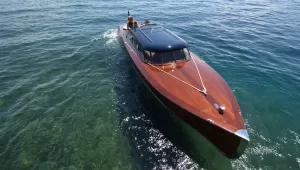
When is Insurance Required?
Even if you’re not in a state that has laws mandating insurance, there are places and circumstances that may require you to have insurance regardless. The most common times when insurance may be required are when financing your boat or when docking at a marina.
When You Finance Your Boat
When you finance your boat, your lender may require you to carry some kind of boat insurance. This is especially the case when the bank uses the boat as collateral. This ensures that the boat will be repaired to like-new condition if it is ever lost, stolen, or otherwise damaged.
It’s important to note that your policy may not require you to carry year-round coverage. However, when you finance your boat, the bank may ask you to carry coverage even when your boat is in storage because your vessel may still be exposed to risks like storm damage or theft.
When You Dock Your Boat at a Marina
If you will be docking your boat at a marina, don’t be surprised if you are required to show proof of insurance before you sign any contract. Always be sure to read the fine print to make sure your insurance policy meets the requirements before entering into the contract. Many marinas require boats to at a minimum have liability insurance that will pay out $300,000. Some marinas also require an endorsement on your policy to list them as the additional insured or additional interest so as to avoid negligence claims. Many harbors have their own liability insurance to provide protection in situations where they may be at fault.
What Does Boat Insurance Cover?
When you buy a boating insurance policy, the standard insurance generally covers property damage, bodily injury, collision, comprehensive, underinsured or uninsured motorist, and medical payment coverage. This protects you and the vessel if someone gets injured while on your boat, if your boat is damaged, if you cause property damage to another boat, or if other damages result from a collision with another boat. Comprehensive coverage pays for repairs in the event your boat gets damaged from something other than collision, such as vandalism, storm damage, or theft.
Uninsured and underinsured motorist coverage provides insurance in the event that someone who is uninsured or underinsured causes damage to your boat. Medical payment coverage helps cover the cost of medical bills as a result of an accident regardless of who is at fault. Some policies may provide additional coverage for funeral expenses.
Your insurance should cover anyone who will operate it. On the majority of boat insurance policies, all licensed drivers are covered. However, if an operator doesn’t have permission from the owner or is not licensed, the insurance coverage would likely be null and void.
Additional Coverage Options
Boat insurance has a variety of products from which you can pick and choose to expand your personal coverage as needed. These include:
Emergency Service: Covers costs associated with on-water emergencies, such as towing your boat.
Special Fishing Equipment: This covers the cost of any special fishing equipment you own.
Wreck Removal: If your boat is wrecked, this covers the cost of removing it from the water.
Temporary Repairs: Pays for reasonable repairs you make to prevent additional damage to your boat.
Rental Reimbursement and Liability: If you’re unable to use your boat due to repairs, this covers the cost of renting a replacement, along with any required liability insurance.
Ice/Freeze Coverage: Covers damage to your vessel caused by freezes and ice.
Fuel Spill Liability: Covers the cost of cleaning up fuel spills.
Fishing Tournament Reimbursement Fee: If you cannot participate in a fishing tournament because of a covered loss, this coverage will reimburse your entry fees.
How Much Can You Expect to Pay for Boat Insurance?
There are many variables that go into determining your insurance rates, such as the size of your boat, the value of the watercraft, and your accident history. If you have a small boat or vessel with less than 25 horsepower, you may find that your homeowner’s insurance policy provides all the coverage you need.
It’s worth investigating, but often this coverage can be as low as $1,000 or up to 10% of your home’s value. If your homeowner’s insurance policy doesn’t provide the coverage level you need, you’ll need to purchase a separate boat insurance policy. You may qualify for discounts for bundling your insurance products together with the same company. You may qualify for additional discounts if you have a safe boating record, are the original owner of the boat, have completed a boating safety course, or pay the policy in full.
Pay attention to restrictions and limitations on the types of boats your insurer will cover. Check coverage options before purchasing a boat or policy.
Final Thoughts
Accidents are bound to happen eventually, even if you live in a state that doesn’t require boat insurance. If you spend a lot of time on the water or want to protect your vessel while it’s in storage, investing in boat insurance is a smart move. Get quotes from multiple companies and compare them directly to ensure you have the best coverage at a price you can afford.
Flaugh Insurance is an independent, family owned, local agent who writes with several national carriers for auto insurance, home, insurance, farm insurance, and so much more. We can service all of your insurance needs no matter where you are located – Benton Harbor, St. Joseph, Stevensville, New Buffalo, Hartford, Coloma, Watervliet, Berrien Springs, and many more! Call our office today to review your insurance at 269-925-0611 or visit Flaugh.com to fill out a FREE quote form 24/7!
